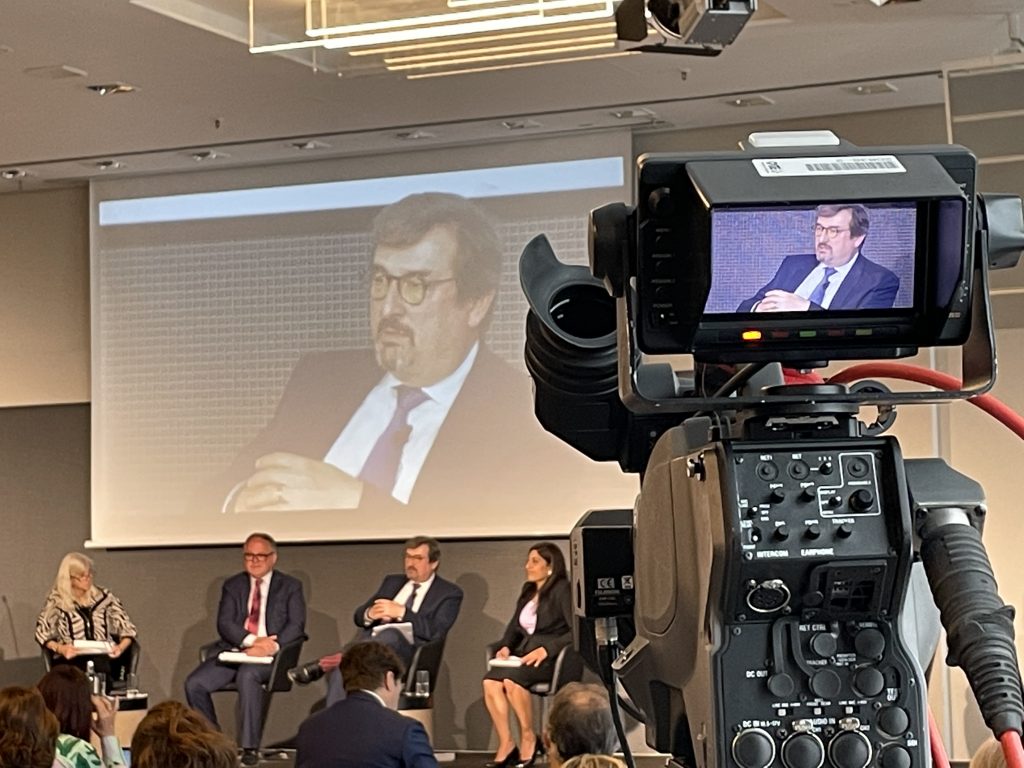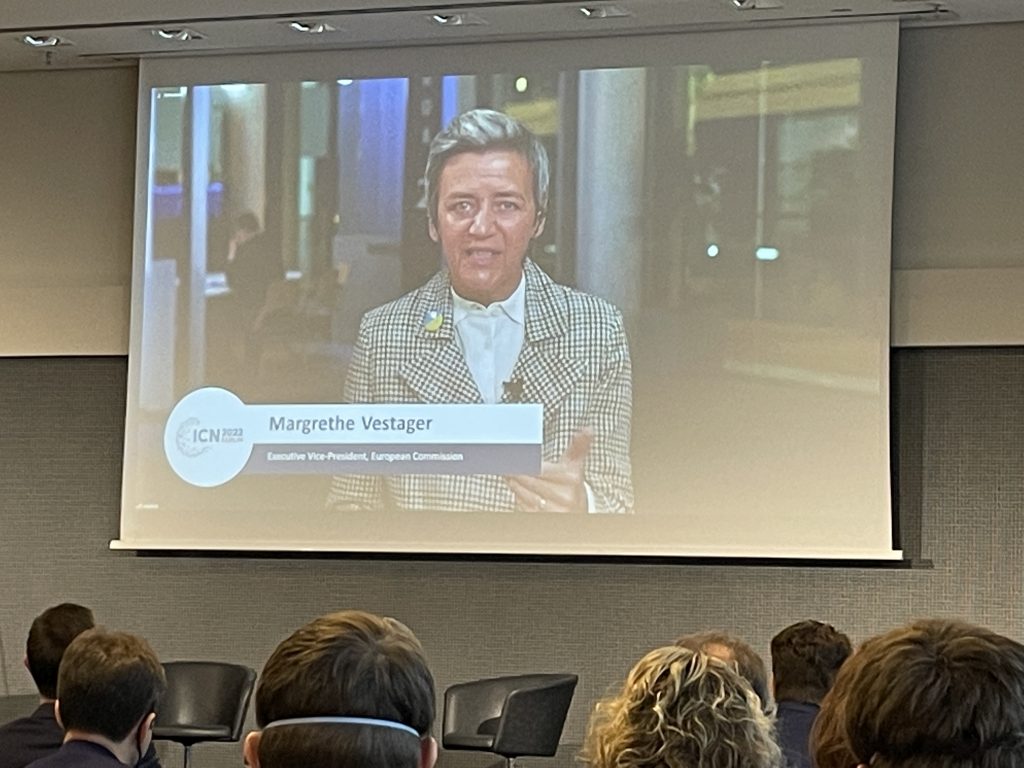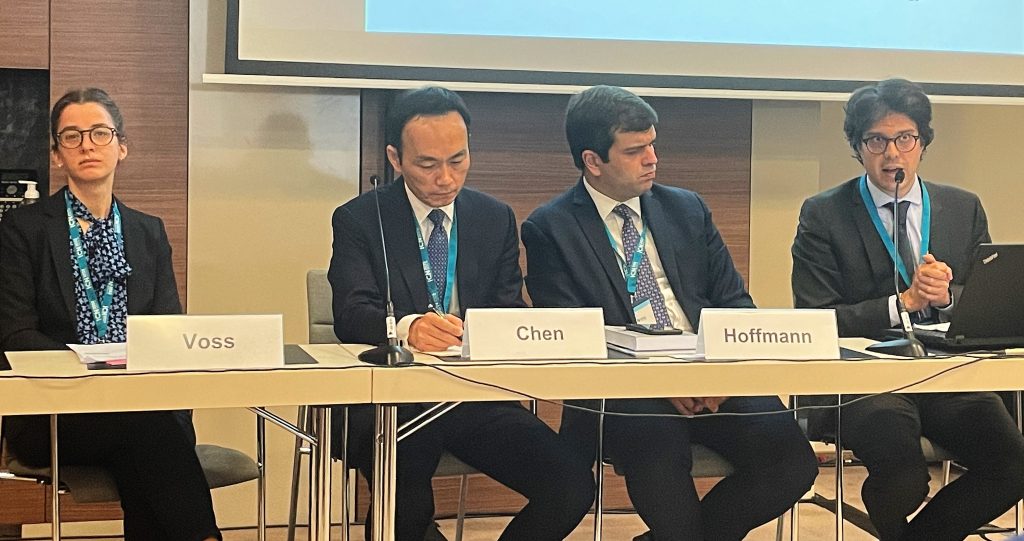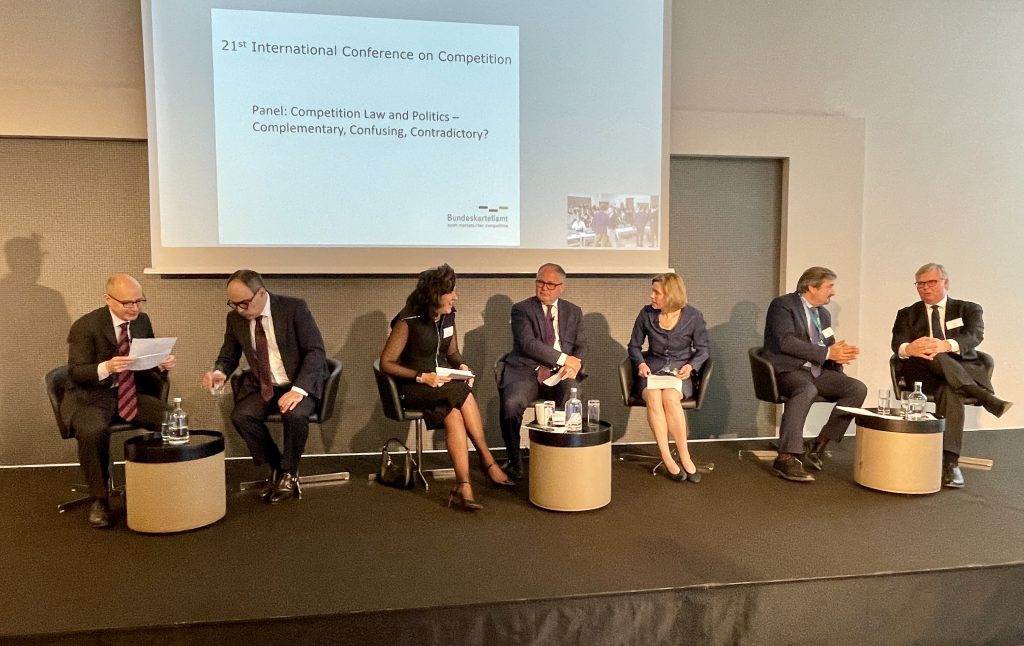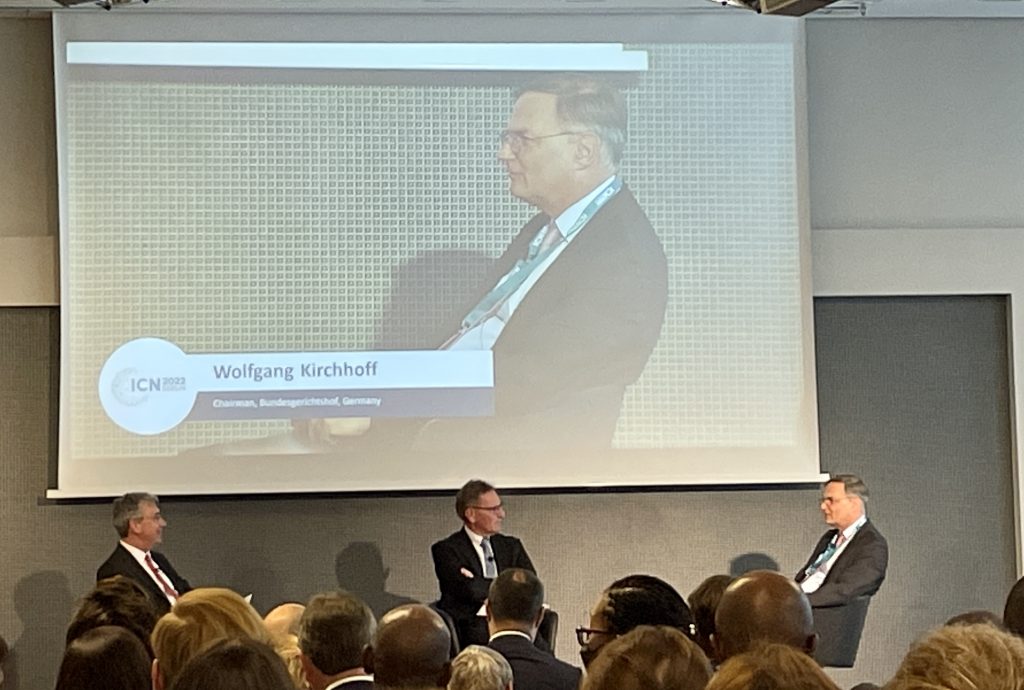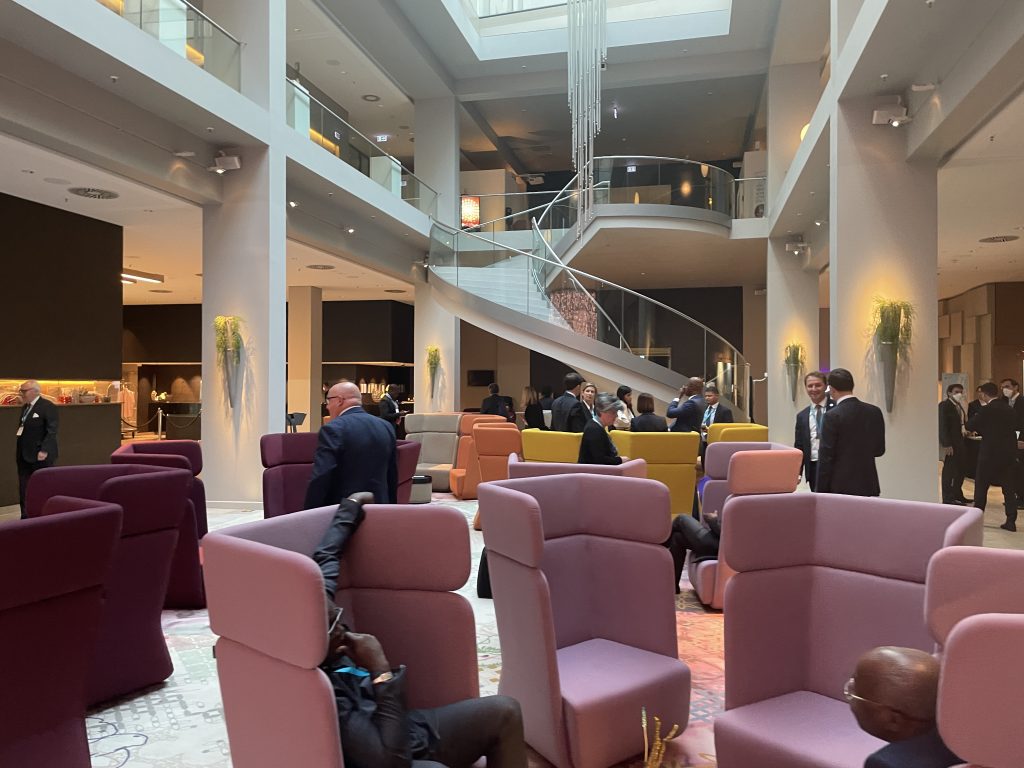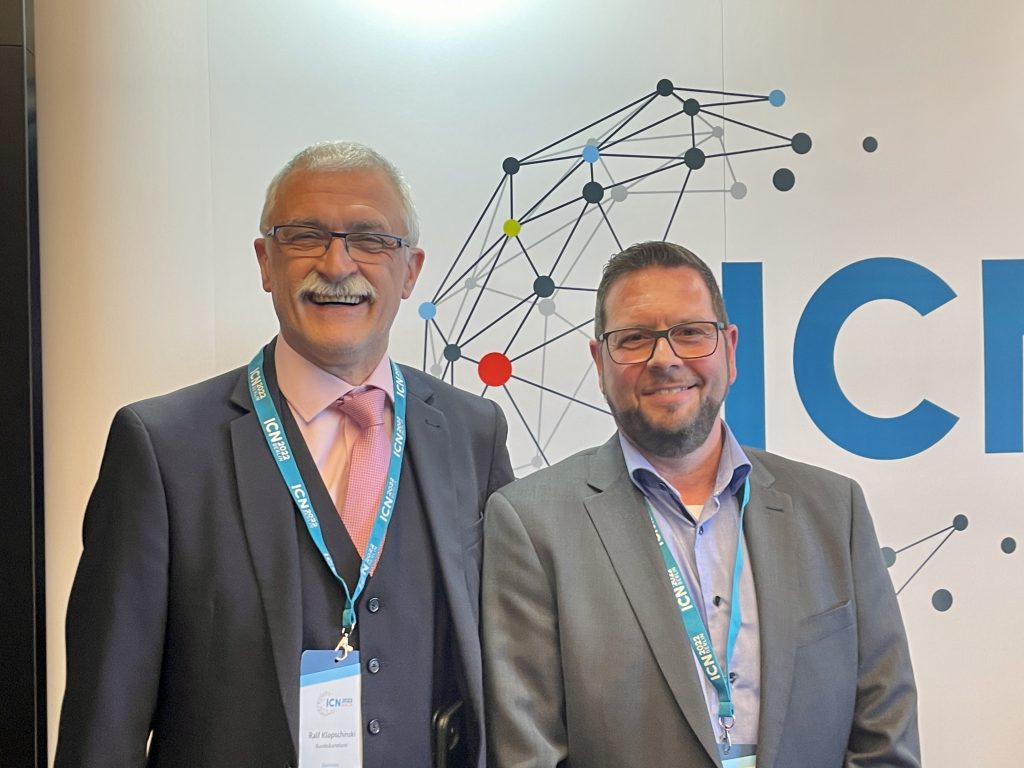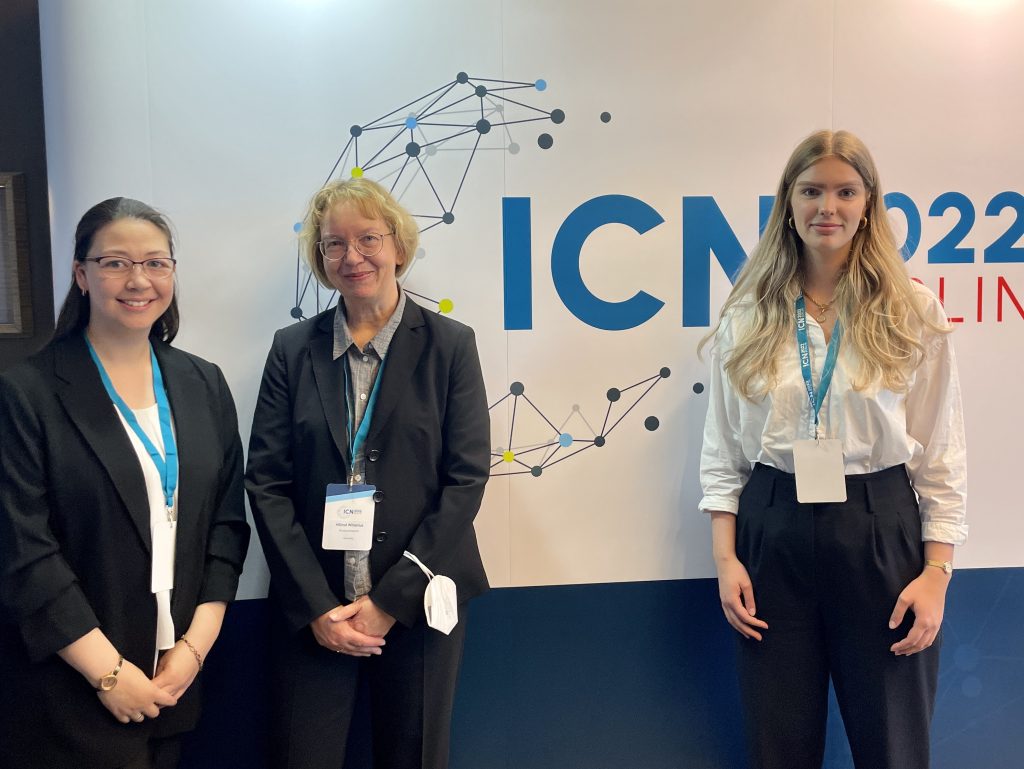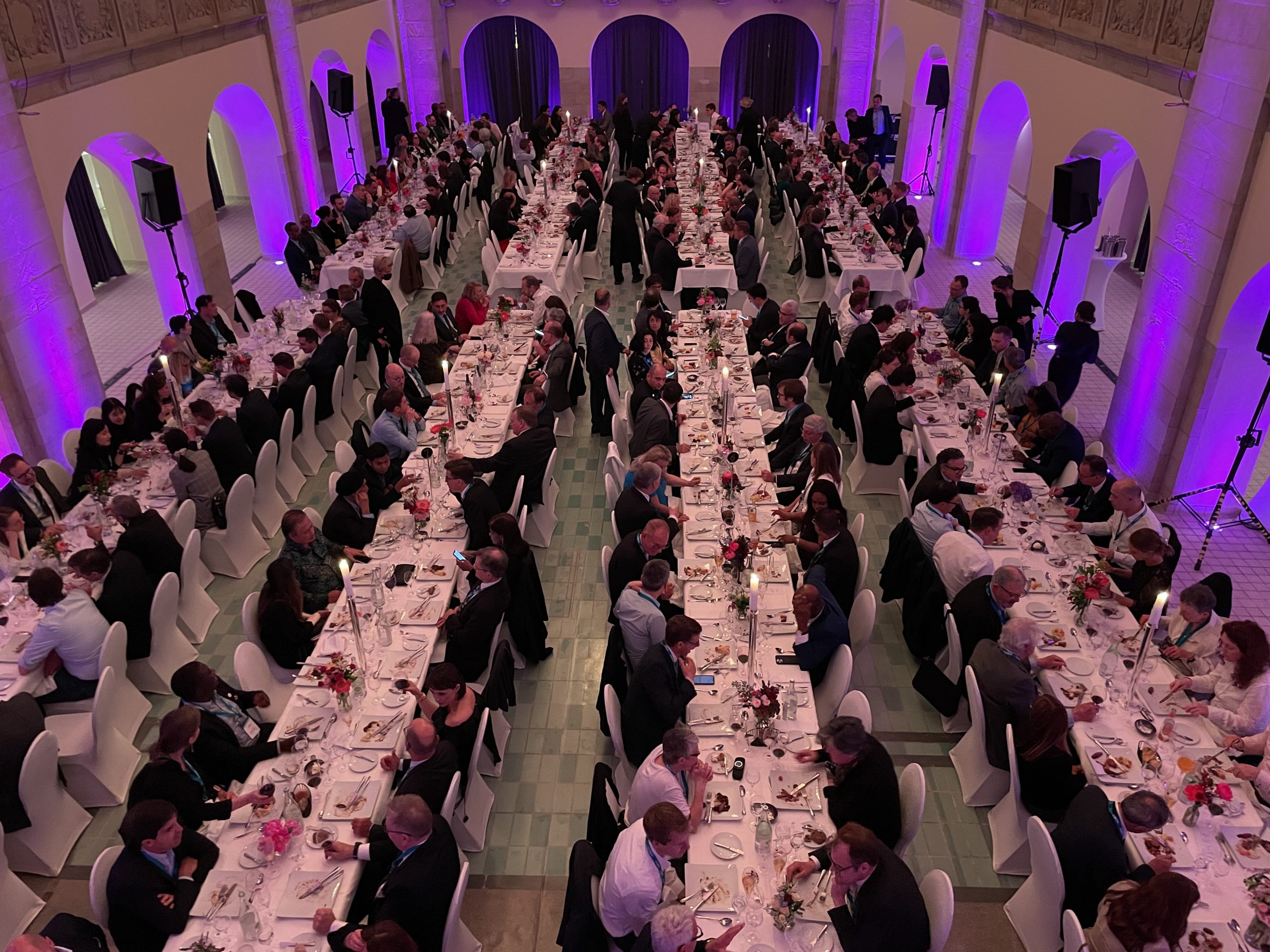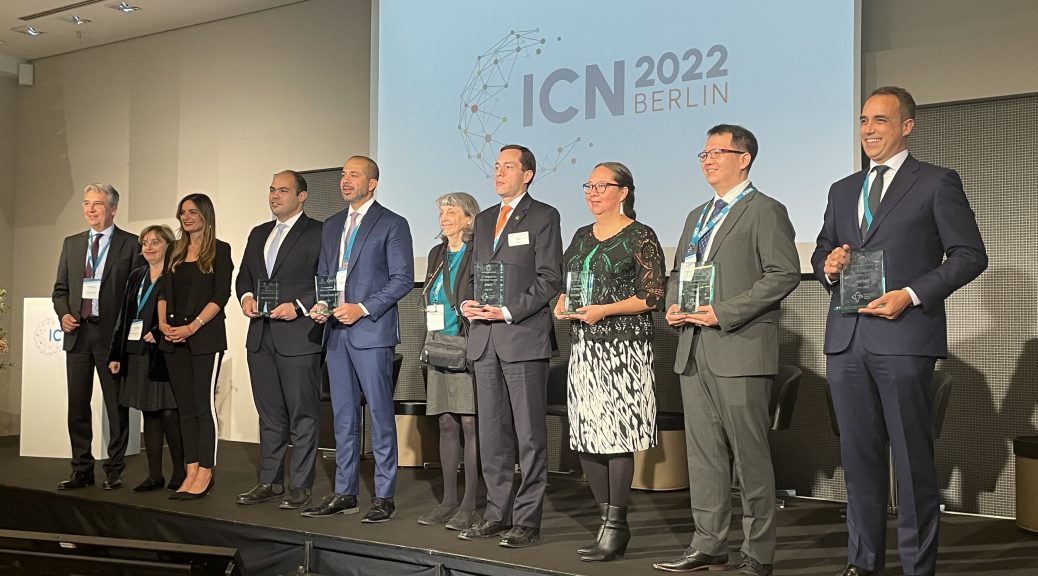
Conference Debriefing (30): IKK & ICN
It was the World Festival of Competition Law: Representatives of competition agencies came together in Berlin to celebrate two consecutive conferences: The traditional Bundeskartellamt’s International Cartel Conference (IKK) and the Annual Meeting of the International Competition Network (ICN). Most everyone was there, and so was Rupprecht Podszun who gives his Conference Debriefing here.
Name of Event: XXI. Internationale Kartellkonferenz & 21st ICN Annual Conference
Topic: “We are family!” – Okay, that was not the official topic, but it had a bit of that first family reunion after years of online-only.
Place & Time: 4-6 May 2022, Berlin, Steigenberger hotel, just around the corner of the Chancellor’s office.
Host: Andreas Mundt, the Bundeskartellamt’s President, is also Chairman of the International Competition Network (ICN), so he ran the show (together with Barbara Schulze, Olaf Wrede and many others from his staff).
Audience: On entering Nolle, that fuddy-duddy quaint Berlin restaurant where you meet the night before it all starts (see picture), I bumped into Cristina Caffarra and Andrea Coscelli, passed our academic icon Eleanor Fox, saw Konrad Ost cornered by a group of antitrust lawyers such as Thorsten Mäger, Marc Besen and Alexander Birnstiel, met my colleagues Jens-Uwe Franck, Florian Bien and Gerhard Wagner and saw top judges like Ulrike Picker, Anne-Christin Frister or Patricia Rombach. With ICN taking over from IKK, the audience becomes more international and more agency-driven: ICN had an unimaginable number of top enforcers from all over the world – at dinner on Thursday (at a spectacular location), I came to sit next to Bundeskartellamt’s merger eminence Fabian Pape, but we were squeezed in between top ranking officials from Singapore, Saudi-Arabia, South-Africa, Portugal and Malaysia. And Graciella Miralles, of course, the ever cheerful World Bank competition expert.
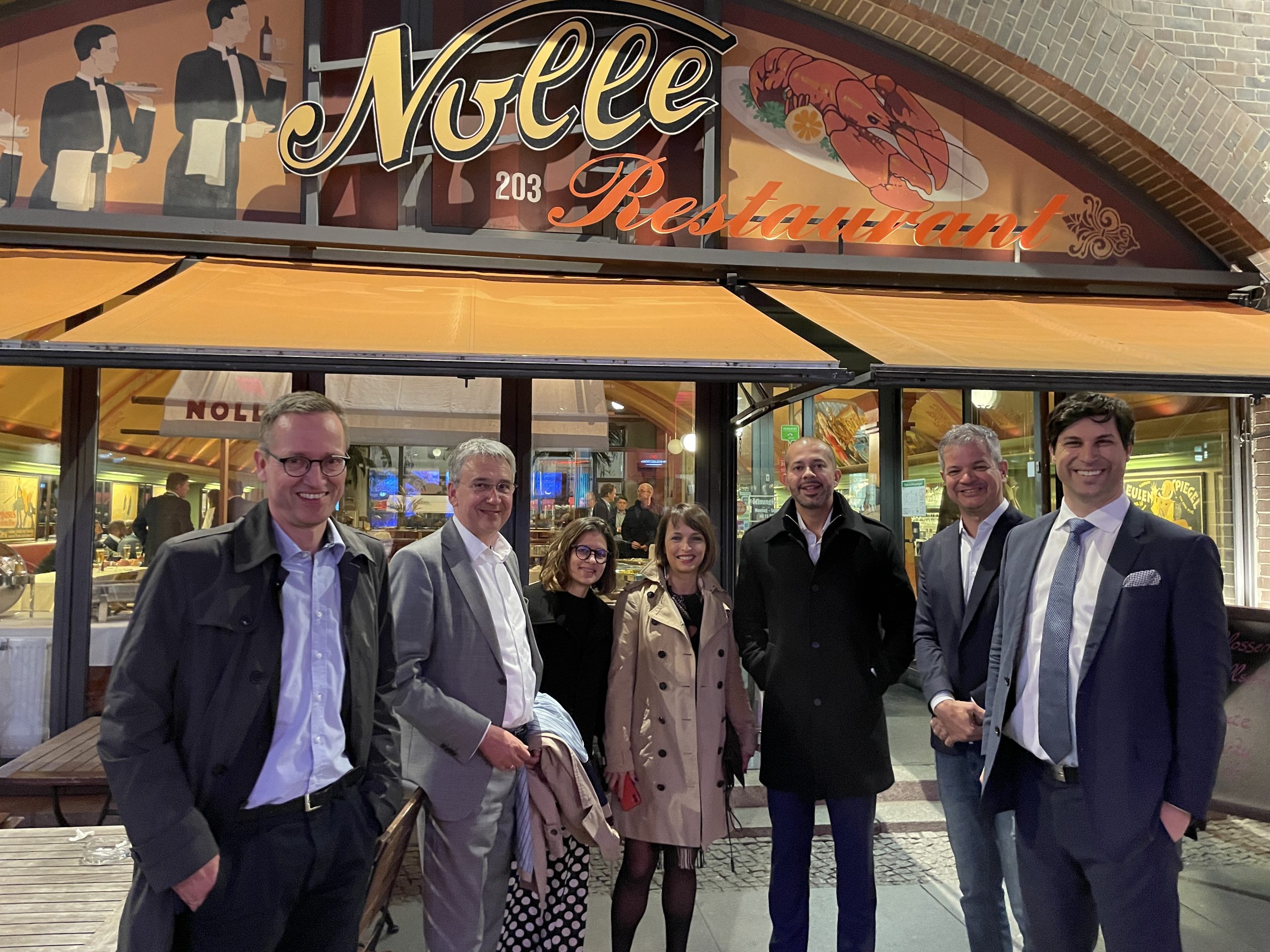
So, are we back at pre-Covid conference business again with damp handshakes and last man standing at the bar-contest?
According to my faint knowledge of such matters, Berlin’s party crowd has a “Don’t ask, don’t tell”-policy, so even if I knew about what people did late at the bar… What I can disclose is that everyone’s wearing tie again. Well, everyone but Robert Habeck and André Schwämmlein, but then as a green Vice-Chancellor (Habeck) and as a start-up-entrepreneur-turned-market leader (Schwämmlein) you may have to follow your own dress-codes. Jörg Nothdurft, the chief litigator of Bundeskartellamt, was the only one who stubbornly wore an FFP2-mask all the time – he had to plead the Facebook case before the European Court of Justice’s Grand Chamber a couple of days later and wanted to keep fit for this once-in-a-lifetime-opportunity.
André Schwämmlein – is he the German Elon Musk?
Let’s not assume the worst! We don’t like Musk anymore, remember, ever since he threatens to take our beloved Twitter-toy and break it. Schwämmlein had the CEO slot at IKK, telling the story how he once read the German government’s coalition treaty, learned that the long-distance bus market would be deregulated and then decided to enter the bus-biz with Flix, a bus company driven by digital means. I spotted Armin Jungbluth, formerly in charge of competition policy in the German government, nodding: He vividly remembered that great tale of deregulation. Flix’s market share in long-distance bus travelling is now close to monopoly in Germany after a fierce battle with competitors. And Flix bought Greyhound, you know, that bus line Billy Joel took when he was in a New York state of mind!
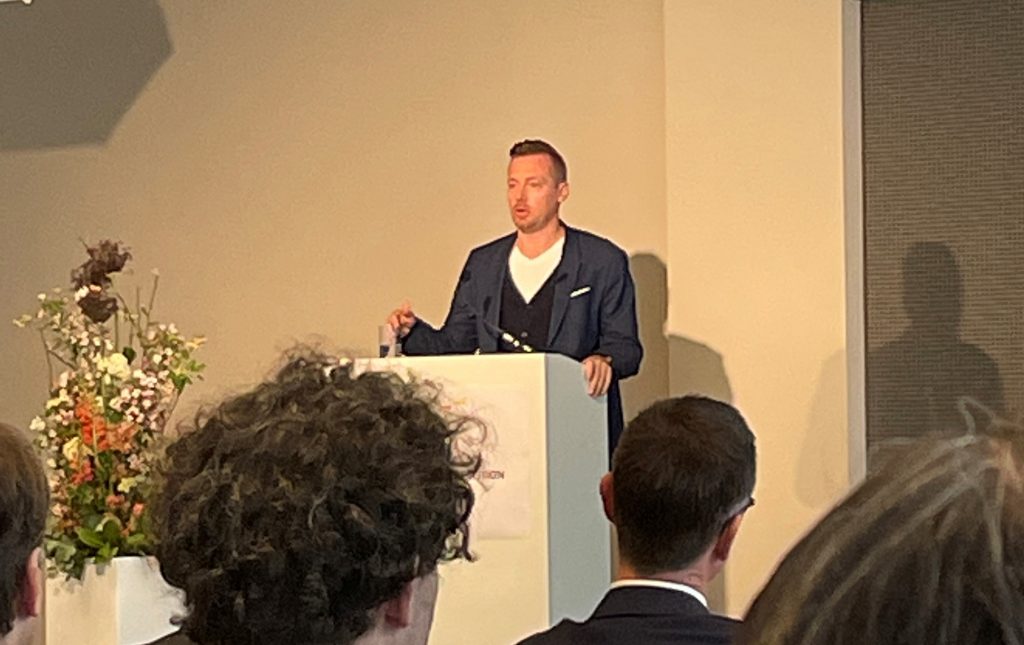
And Flix runs trains, too, right?
They try to, and they are the maverick in that business with negligible market shares. According to the Flix CEO, German state-owned incumbent Deutsche Bahn spent millions of taxpayer money to keep Flix out of business. “Why did we prevail? – Because we placed consumer interest first.” Hea-, hea-, heart-warming! Schwämmlein had very clear messages: First – cut down red tape and reform the outdated regulatory frameworks. Second: If you have to deal with a state-owned enterprise like Deutsche Bahn, it is good to have a supranational body like the EU Commission. Third: Build the digital and physical infrastructure so as to make innovation happen.
I’m sure he had a funny anecdote on German bureaucracy!
Not so funny this time: It takes months to get the approval of all districts, the Landkreise, in Germany for running long distance bus lines, although it is clear that you are entitled to anyway. But what is more: It takes two years, he said, to get a licence in Germany to take people directly from Kyiv to Berlin and vice versa. Flix runs this line with a mandatory stop in Poland now. And coaches are full in both directions, by the way.
Not good, not good that it takes so long. So, Ukraine was also on the agenda?
In the last panel on Thursday afternoon, Olha Pishchanska took the floor. Johannes Bernabee of the Philippines Competition Commission introduced her with very warm words. Pishchanska is the Chairwoman of the Anti-Monopoly Committee of Ukraine. It was certainly the most emotional moment of the conference.
She is, well, working like normal? She came to Berlin?
Oh, yes! They seem to carry on business. Ukraine is an active member of the antitrust community, currently they have a twinning project running with Lithuania, Germany and Romania. She read out a speech full of determination, hope and courage, emphasizing the role of competition in the post-war-reconstruction of Ukraine after the victory.
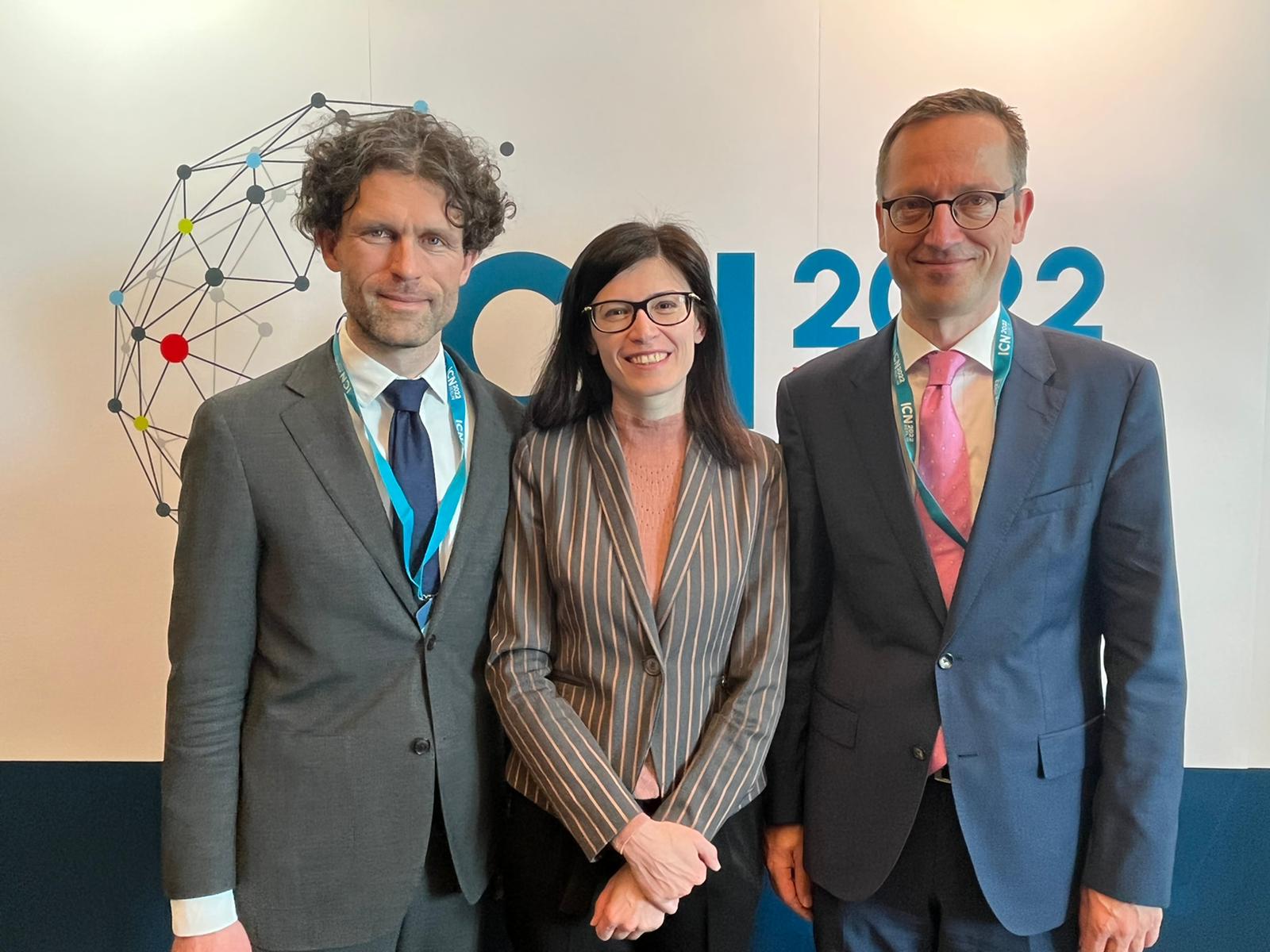
Phew. We never quite expected to deal with post-war economies in competition law…
That’s not true: The whole introduction of EU competition law was a post-war endeavour, and I also may remind you of my blog post recently on re-reading the ordoliberals… Anyway, would be of interest to see how the states in former Yugoslavia dealt with reconstruction tasks and whether competition played a role.
But the war was not the big topic.
Indeed. Two and a half other issues dominated the conferences. The number one topic was: How can we get nastier tougher, smarter, more effective in enforcement?
Ugh?! That’s what you were talking about at this conference?
This is where enforcers meet! People from the agencies outnumber all other stakeholders by far so, yes, they tell each other how to make the cartel crackdown more effective, how to analyse data in merger control or how to lobby for competition vis-à-vis governments.
Oh dear, they stir up each other how to get on the nerves of companies?
I would not go that far, but ICN is for agency learning, yes. You can be an outsider if you are that one representative of the antitrust bar who is allowed to be on the panel. Take Ingo Brinker for example: He sat on the outer wing of a panel with agency leaders Andrea Coscelli, Jonathan Kanter, Benoît Coeuré & Olivier Guersent. These four agency leaders had economists Cristina Caffarra and Fiona Scott Morton with them, both of them are not exactly known as advocates for restraint in enforcement. So, it was Brinker (who is the head of the German Studienvereinigung) who once in a while had to use words like “predictability” or “separation of powers”. Rights of defence is not the pet subject of enforcers.
Guess so. I am so sorry, but please help me with this name: Benoît Coeuré is…
…the new Président of the French Autorité de la Concurrence. When he took stage, I saw him being googled on basically all smartphones around me. What we know so far: He is an economist. He is an eloquent speaker. He held posts in the French Finance Ministry, the European Central Bank and the Bank for International Settlements. And that means: He has a soft spot for financial regulation – something he has in common with EU Director General Olivier Guersent and the German State Secretary Sven Giegold. The three of them emphasized this a couple of times, so financial regulation could lead the way for competition policy reforms…
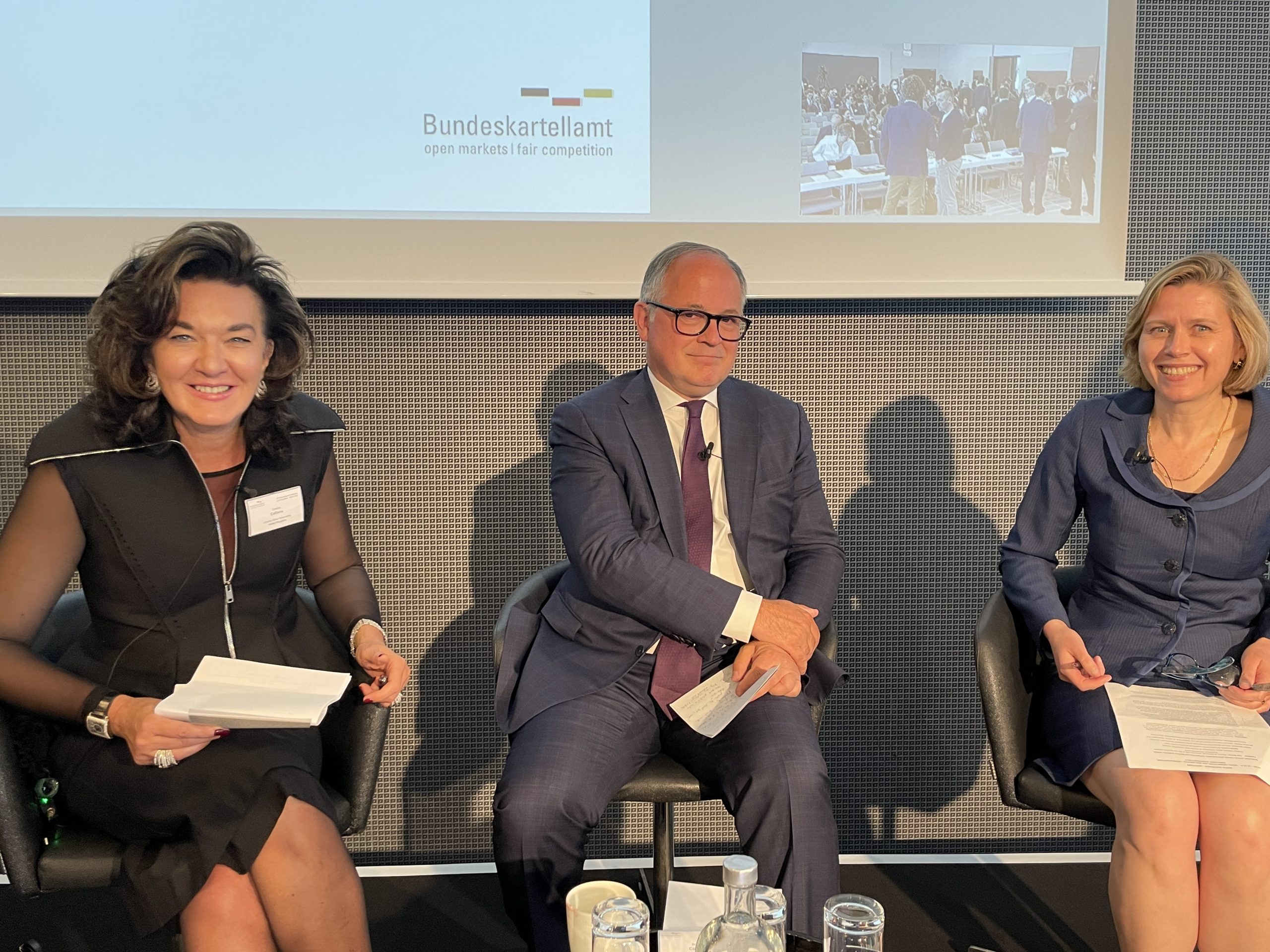
Not sure I like that. What became of Isabelle De Silva, by the way?
She now presides the 6th chamber of the Conseil d’Etat in France, which means she adjudicates on administrative cases in environmental matters. She was still referenced as a heroine of the second big topic.
Which must be the fight against Big Tech.
Absolutely. In a breakout session, we heard from Grégoire Comet Daâge how the French use interim measures (a tool they use more frequently than others) to push Google into negotiations with press publishers, and Katharina Voss reported an interim measure in a case from Sweden concerning housing statistics. So, the digital cases were prominent. The whole conference started with Sven Giegold’s opening address. Giegold oversees Germany’s competition policy and is the architect of the Agenda2025 that is currently discussed in this blog. His speech (that you can read here) was a straight-forward attack on what he called “antitrust redux”: Competition policy with a too narrow focus on consumer welfare and a track record of under-enforcement. In other times, the US delegation would probably have left the room, but this went down well with the Biden admin representatives like Jonathan Kanter. Expect the German government to advocate for structural separation, tougher merger control and the “New competition tool” on an EU level. It was a strong start for the conference, not least since Giegold proved to be a funny guy.
On Big Tech, Mundt disclosed that Meta is now an addressee of section 19a of the German law!
And what is more: Menlo Park does not appeal that decision. It means that the Bundeskartellamt can now go after Facebook’s activities with the specific provisions of section 19a (2). That is a bit like the Digital Markets Act light. Other than with the DMA companies can still bring an efficiency defence under section 19a and the obligations need to be activated – in the DMA there is no efficiency defence and obligations are supposed to be self-executing (even though many do not believe this…). It will now be a race of enforcers: The Germans will try to put their 19a-cases in their shop window before the DMA finally takes real effect in 2024.
Margrethe Vestager probably does not give a LIKE for that.
Well, it’s fair to say that the EU Commission believes in the digital single market. Some people probably believe that this requires a thick uniform rulebook written in Brussels. Oh, re EU rulebook: Have you noticed the new Block Exemption Regulation on Vertical Restraints, in force as of 1 June 2022? The kid has a name now, it will be Regulation (EU) 2022/720 and it holds some rules for the platform economy. Executive Vice-President Vestager was the notable absent at this conference, she only gave an online-performance: Her speech came from a hallway somewhere in Strasbourg where people were passing by, and in my ears this speech had even less substance than the average statement for such an occasion. But it happened at 9 am in the morning; maybe that was too early for her – or for me.
What was her talk about anyway?
On international cooperation, and she hit a point here. This seems to feature more prominently on the agenda again. Commissioner Yoon Soohyun from the Korea Fair Trade Commission argued in favour of more information sharing of authorities and joint market investigations. Marek Martyniszyn, an academic from Queen’s University Belfast, told me they had an energizing panel on enforcement against cross-border cartels involving Natalie Harsdorf-Borsch from Austria, Sabine Zigelski from OECD and others. I wrote my PhD on this topic, so I…
We better quickly move forward: Do the enforcers think they did a good job on Big Tech?
Mundt said: We brought brilliant cases, but I doubt we had the impact. And Coeuré seconded: There were banks too big to fail, and now we have companies too big to tame with competition law.
His financial regulation background…
He defined the three Ds if you wish to succeed in digital markets: Diversify your instruments, Dare use all instruments, enter into Dialogue with others. Guersent, taking on Alphabet, taking up the alphabet said, for him it is the three E: enforcement, enforcement, enforcement.
I wonder what the F-word was!
F as in… fumble, maybe? The enforcers were pretty sure who is fumbling with their nice cases. In the words of US-antitrust czar Jonathan Kanter: We need to bring the cases. But the courts should develop. Fiona Scott Morton also said that the courts are the major roadblock to changes in antitrust law: Judges, so she argued with a view to the US, do few cases, do not know the digital products and rely on Chicago ideology instead of applying the law. By coincidence I sat next to Marc Van der Woude, the President of the European General Court, during this and he raised an eyebrow here and there.
He had the chance to reply, right?
Yes! When Van der Woude’s phone rang while he was on a panel, he took it out of his jacket, showed it to his co-panelist Wolfgang Kirchhoff and asked him: “Oh, Wolfgang, look at this, do you know what this is?” It was hilarious.
So, the judges did not plead guilty?
I sensed that Van der Woude and Kirchhoff see the problem – which is, obviously, not the same in the EU as in the US. Van der Woude in particular is up for reforms, regarding length of decisions and proceedings. Kirchhoff made clear what he believes to be key concepts of competition law analysis: consumer choice and freedom to compete. That was a clear-cut statement that is more in line with New Brandeisian antitrust than with the more economic approach.
And Kirchhoff is now a really important judge!
He has been a judge with the German Federal Supreme Court, the Bundesgerichtshof, since 2004, but just two days before the conference, he was promoted to be the President of the German Supreme Court’s Cartel Senate. Kirchhoff, a former Freshfields partner, succeeds Peter Meier-Beck who had been Germany’s highest-ranking competition law judge before.
He was a partner with Freshfields and became a top judge? That does not sound like Germany.
He is a very rare exception. Revolving doors are not typical for German courts or authorities. It was a bit funny for the Germans in the room when – in an entertaining talk – the new head of the Australian watchdog ACCC, Gina Cass-Gottlieb discussed with her Dutch counterpart Martijn Snoep what competition agencies could learn from law firms. Cass-Gottlieb mentioned things like diversity, inclusion, flat hierarchies and LinkedIn-wisdom such as “make people grow and grow with the people”. Snoep added that a good Alumni network is wonderful with a party once in a while. In Germany where agency staff usually stays for a lifetime with the Bundeskartellamt that would be mostly a retirers dance party.
You said there were two-and-a-half dominating topics. So we have international cooperation and digital competition law. I guess the remaining half one is sustainability?
Nope. Sustainability only featured in one breakout session where Ori Schwartz from the OECD kicked off with economic methods to measure sustainability benefits. That sounded like a hypothetical exercise. Hardin Ratshisusu, a competition commissioner from South Africa, explicitly warned against integrating sustainability into competition law analysis: “We are enforcers, not policy makers”, he said, adding that it is the large firms profiting most from environment-driven exemptions, not the SMEs. Georg Boettcher from Siemens (large firm, not SME) was sitting right next to him, but even he did not seem to be too eager to ask for new exemptions. The problem, he explained, is not primarily the end product, but the production process: Most emissions happen before the product even enters the Siemens production universe. Boettcher seemed a bit dismayed with the proposed Commission Guidelines on horizontal cooperation that may make it even harder to cooperate for sustainability goals. The panel was interesting, but cooled down expectations.
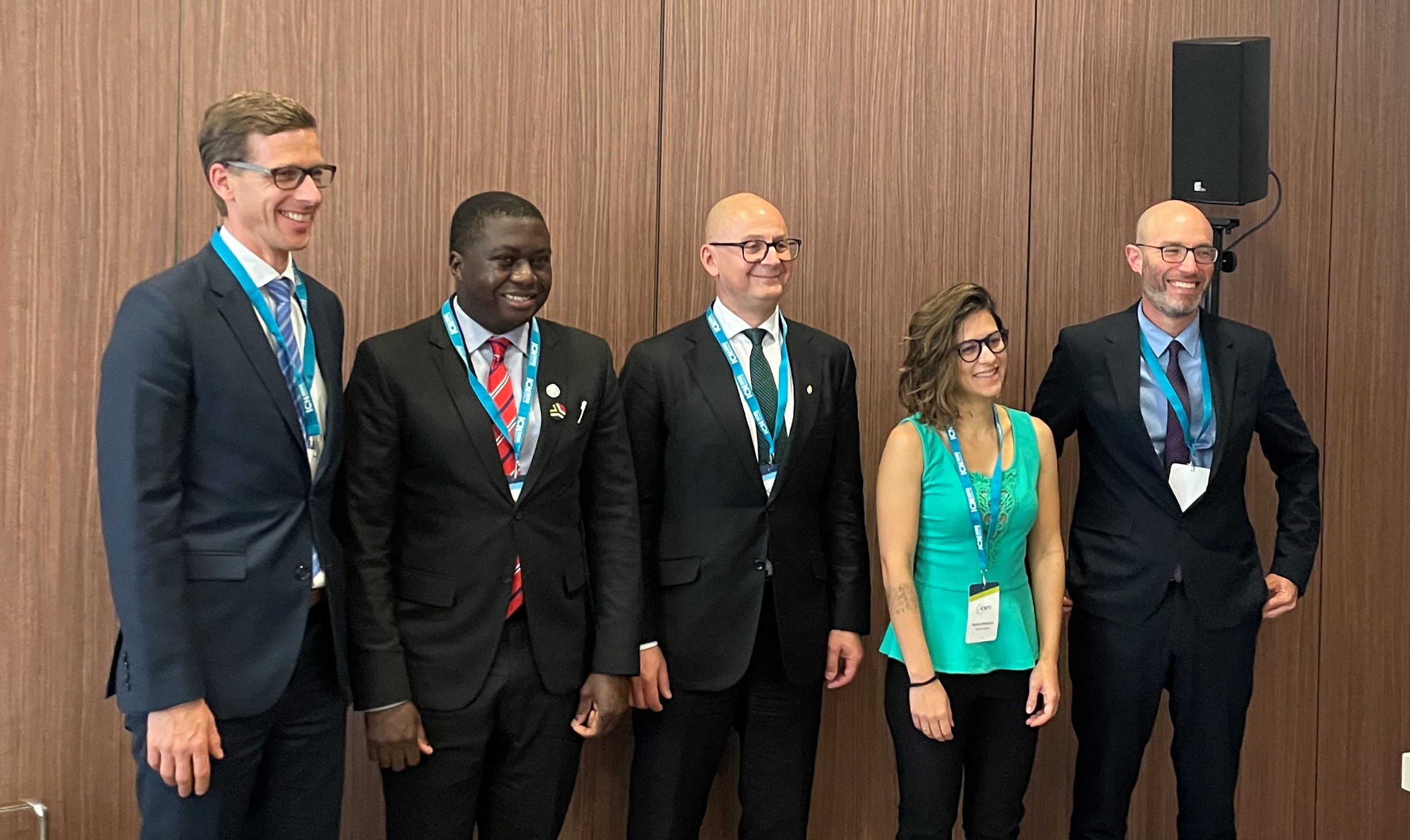
If not sustainability – what was that other big issue!?
Inflation. It did not come up on panels too often, but in private talks many are concerned. If prices go up people may call for antitrust intervention. If the economy goes down people may call for less antitrust intervention. Thorsten Käseberg from the Ministry of Economics recently imported the US debate into the German arena in an insightful editorial for NZKart 2022, 173 (and you know how difficult it is for me as an editor of WuW to praise the rival journal). In French elections, the topic of “pouvoir d’achat” had nearly brought the extreme right into the Elysée. Fiona Scott Morton said we need to take care of markets since the consequences of inflation will be much more hard-felt in concentrated markets than in more competitive ones. So, competition law can be of help, but it will not be the ultimate cure – this is Käseberg’s point as well. Still, doing antitrust law in times of inflation will differ from doing it in more happy-clappy circumstances.
You were on a panel, too.
Yes, with legendary Bill Kovacic, formerly of FTC, Tembinkosi Bonakele from South Africa and Matthew Boswell from the Canadian Bureau. We discussed privacy, consumer protection and competition law for a moment. There is a widespread call for cooperation with other agencies which is a good thing, of course (even though I believe that competition agencies should just do their work, not enter into too many talking shops). Ioannis Lianos, the hyper-energetic academic turned head of agency in Greece, takes cooperation to new levels: He does training sessions with BEUC, the consumer association, and has far-reaching stakeholder programmes in place, including trade unions, environmental groups and university researchers. He also wants to launch a global hackathon for antitrust problems.
Wow! There’s a lot going on!
Indeed! Colombia took an ICN award for an Artificial Intelligence tool with which to detect regulation that hinders innovation – see the photo from the award ceremony heading this post. Dimensions grow bigger in terms of scope, content, methodology and sheer size. Andreas Mundt recounted that the first IKK took place in the backyard of his predecessor Wolfgang Kartte’s private home in 1984 with sausages (what else – in Germany!). He had 14 guests from other antitrust agencies in those days. Mundt confessed that his home in Bonn would not suffice to take in the 2022 crowd.
I guess the government needs to work on his paycheck.
Antitrust enforcers are not that selfish. They only have the public good on their minds! When they say “We need more resources!” – an obligatory line on all panels – they mean their agencies, not themselves.
On the author: Rupprecht Podszun holds the Chair for Civil Law, German and European Competition Law at Heinrich Heine University Düsseldorf. He is a Non-Governmental Adviser to the International Competition Network. He was not able to attend the third day of the ICN conference when Lina Khan, Andreas Schwab and a Spree River Cruise were headliners.
Don’t forget to subscribe to the e-mail alerts on new postings on this blog – here!
